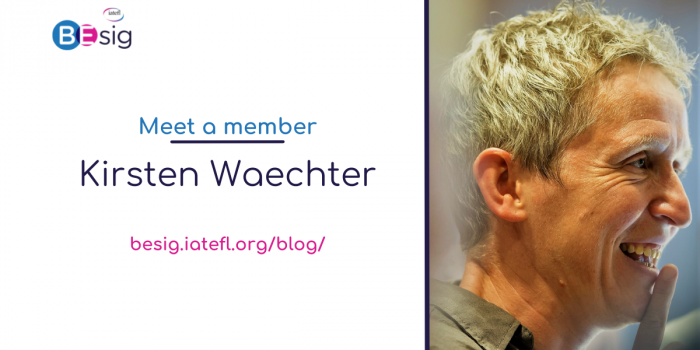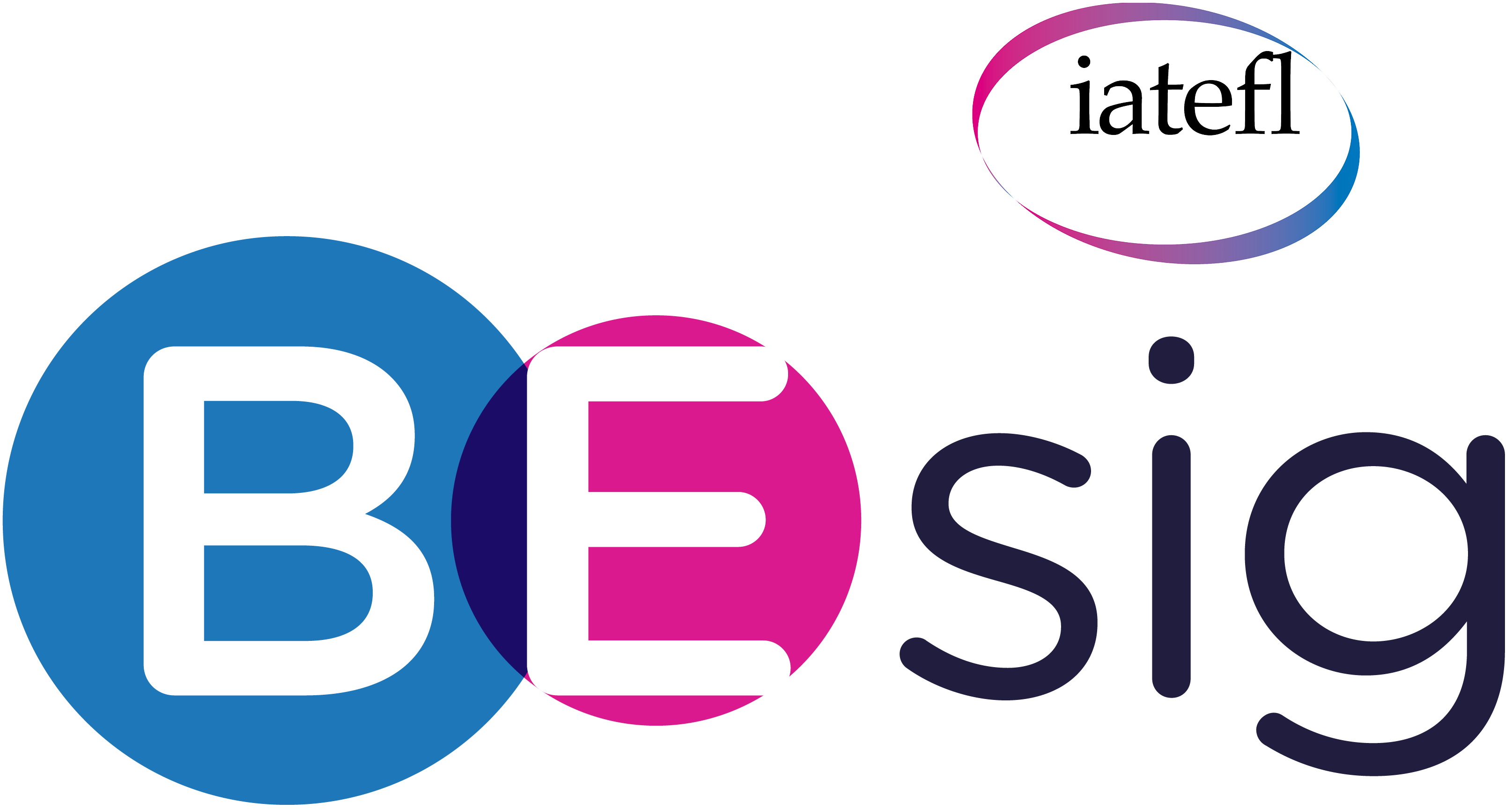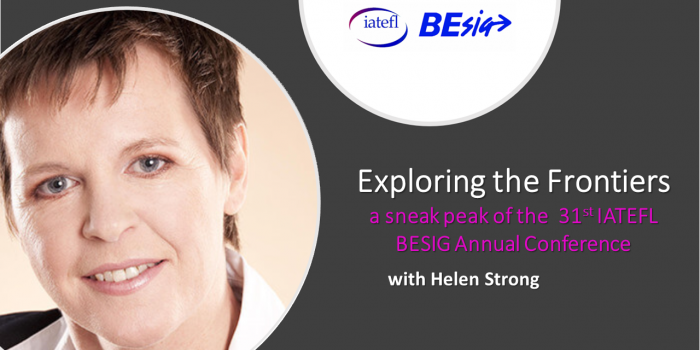
With the annual IATEFL BESIG conference still buzzing in our brains, our next interviewee has some tips and tricks to share with prospective conference speakers. Kirsten Waechter has been a behind the scenes IATEFL BESIG volunteer for many years and in this interview, she tells us a bit more about her training philosophy, methods and style. Read on to find out more.
Bio
Kirsten Waechter has been a business English trainer since 1998. In addition to in-company courses, she focuses on teaching business communication, ESP and intercultural courses. She also designs her own materials for print and online providers. She divides her free time between Scotland, Sweden and Germany.
How long have you been involved with IATEFL BESIG?
Well, I attended my first IATEFL BESIG conference in Dubrovnik in 2011, and started writing for Business Issues straightaway because the then editor, Julia Waldner, approached me. I also did my first webinar that year as a follow-up to my presentation in Dubrovnik. As a volunteer, I actually got involved by accident in 2015 when I was asked to help the Maria Keller Scholarship winner with her presentation at the annual conference in Sitges. So, I became an informal mentor of the scholarship winners and first-time presenters. We decided to record a number of short videos on that topic and, together with other colleagues, we published the conference presentation guide, which, I am proud to say, even a lot of experienced presenters find quite useful.
Next, I found myself helping out on the online team as one of the joint web and online coordinators stepped down, and I have been active on the IATEFL BESIG online team ever since, hosting and moderating the weekend webinars and workshops, briefing the speakers, helping organize and host our online summer symposiums and conferences. When we changed from Adobe Connect to Zoom, the technical side became a bit easier. It has been a very interesting and rewarding experience as I was lucky to learn from and work with some of the best people in the field. I am happy that we now have quite a large team of volunteers on the online team as most of our events are online, something which requires a lot of work behind the scenes.
How did you get into business English teaching?
Again, by accident. I found out that a university teaching career was not really what I was striving for, and I had to make a living. So, I became a freelance BE trainer and translator. One of my first clients was a major provider of negotiation training, which was very helpful to learn a lot of the skills I had to teach in my classrooms. I think that applies to a lot of my classes: only if you are a good learner can you be a good teacher. I learn as much from my students as they learn from me. I have been working with heads of departments and HR recruiters as well as with line managers and accountants. All the company tours and insights helped me a lot to understand what exactly my learners needed and to find or design materials that really help them do their jobs better – in English.
However, working in Germany, one has to face the situation that prices for English lessons, even business English, are pretty low. Thus it became a key objective for me to develop a brand and reputation that allow me to ask for higher fees. So I started not only working with tailor-made materials, but also including communication skills and intercultural competence in my training. If people want to be successful in international jobs, they need more than just a wide range of vocabulary or mastering grammar. There is a higher risk whether you will be given jobs if you decide not to do extensive weekly lessons, but so far, things have worked out fine.
You do a variety of different types of work from training to curriculum development to teacher training. What do you enjoy most?
It is hard to say. I would like to tell a little story here: once I was working with the head of German HR of a multinational car manufacturer, and he was asked to qualify for the Myers-Briggs type indicator in English, which is the mother of all profiling tools. So he profiled me, and one of the key results was that I get bored easily, and I think that is quite true. I need the variety of activities for stimulation and inspiration. I am a generalist, not a specialist: I find everything interesting and exciting, and I like to learn new things and take on new challenges.
I do not think I am a very creative person, but I am pretty good at developing ideas and concepts based on what my learners need. I am also able to tweak and recycle those things. I already mentioned that my work as an intercultural trainer strongly overlaps with my BE training role, and the same can be said for my work as a translator: I learn the vocabulary that I need to teach my students and I am getting paid for it. And then I go and develop materials based on what I have learned. What I enjoy most, however, is the success of my learners: when they managed to chair the meeting, to get that job or to shine in a presentation.
You said you used to mentor first-time IATEFL BESIG conference presenters. What advice can you give someone wanting to present at a conference?
Well, I think you need to be very clear why you want to give this presentation. And why at this conference? Conference presentations are partly self-advertising, but you should also have something worth sharing. Be very clear of the audience you have in mind. Why is your presentation interesting to them? What will be their takeaway? When you submit a proposal, be very clear about the objective and the takeaway. Let other people read your proposal – my proposals were rejected a couple of times in the beginning, but I got better with feedback from my peers. Just because something is clear to you, it may not be clear to others.
When it comes to delivery, always make sure that you involve the audience. Even the most interesting topic gets boring if people only read off a script in a monotonous voice and the audience’s brains are not kept engaged and active. See your presentation as a dialogue and make sure you move around (if you do it face-to-face) to get rid of all this nervous energy in your body that wants to go somewhere (if you do it online, make sure you do a bit of a workout before you give your presentation).
What role should intercultural competence play in the business English classroom? Should every trainer, no matter their experience, be including it?
Well, I have learned that business English and intercultural competence can hardly be separated. You do not do business in English with people from your own culture, do you? In addition to national culture, intercultural competence covers a lot more: corporate culture, diversity management, working in virtual teams, unconscious bias and communication styles: all of these are important elements our learners need to master if they want to thrive in international jobs. So the answer is yes. Thankfully, the market has responded to this: there are now a lot of coursebooks that include intercultural components. You see a lot of presentations a conferences that talk about how to integrate intercultural components.
Likewise, the new companion volume of the CEFR features the category of pluricultural competence, which is slightly different as it sees the speaker as a facilitator and mediator on culture as well as language. At the moment, I am part of a project that develops a professional qualification as a specialist in foreign language communication and intercultural competence for the chambers of commerce and industry in Germany, so there is now awareness of how much intercultural competence is needed in business life. Teachers should really attend a couple of intercultural training sessions themselves. It does not only help to cover those topics in the classroom: it helps reflect on your own cultural preferences and better deal with multi-cultural groups of learners, too.
Who do you currently teach, and what and how do you teach them?
I teach a mixed bunch of people and my target group has not really changed much over the years. Interestingly, I am partly now back at university, but again as a freelancer, teaching academic writing and English for engineering. Most of my courses are ESP, such as English for paramedics or office managers, skills training and in-company courses taught from my office at home. I am very grateful that I have two nice, large screens and very stable broadband internet connection.
There were two exceptions: I decided to teach my teenage niece and my goddaughter online during the first two Covid-19 lockdowns as their schools found it very difficult to cope with online teaching, and I did not want their English performance to drop. It was very interesting to see what they are being taught at school these days, as I can then prepare for my future students when they start working.
If you could do one thing differently in your professional life, what would it be?
Hard to say as I really enjoy my job. But I think I would say no sooner – no to courses that are poorly paid, no to people I do not want to work with, and no to schools or clients that do not treat their trainers respectfully. I mean, we make them the money, so I think that should be rewarded. In the beginning, when you start as a freelancer, you tend to accept every job because you are unsure (and afraid) whether another job will be in the pipeline. So learning to say no and appreciating your own value are two very important things if you want to not only survive in this job, but enjoy it thoroughly.
Questions by Mandy Welfare
Editing by Elizabeth Molt
16 November 2021
MEET A MEMBER is available to IATEFL BESIG members and non-members alike but only features our current members. Another reason to join us and “BE with BESIG.”



